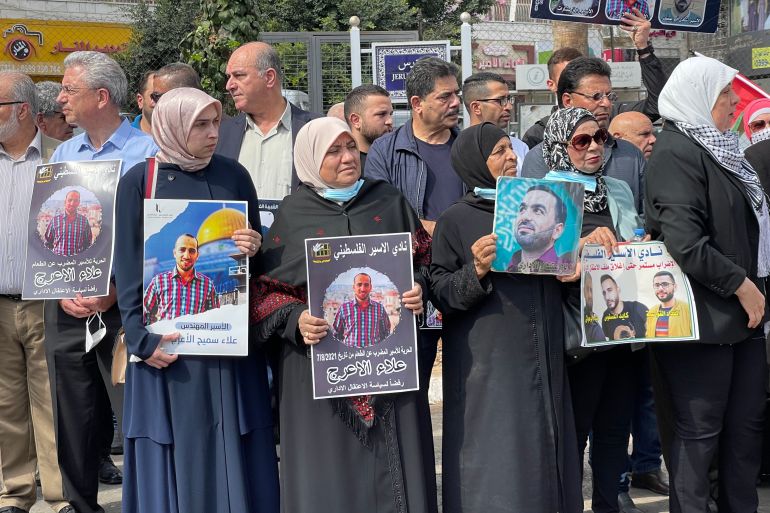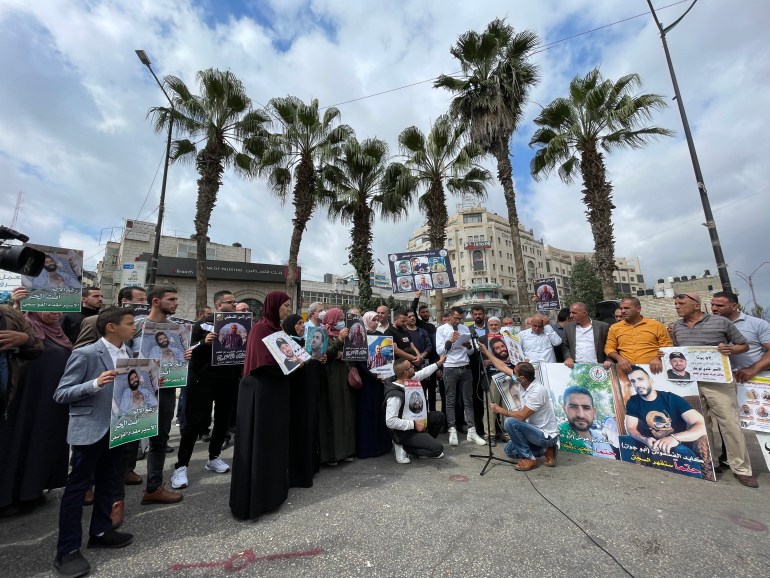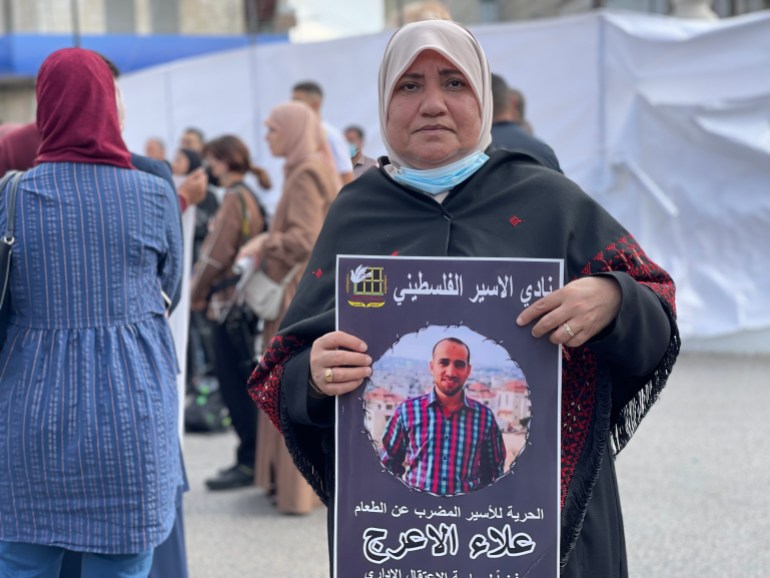Palestinians demand mobilisation to save hunger-strike prisoners
Families of prisoners call for the release of their sons, held in Israeli jails under ‘administrative detention’.

Ramallah, Occupied West Bank – Dozens of Palestinians staged a protest at the al-Manara Square in downtown Ramallah on Wednesday, calling for the release of six prisoners on hunger strike in Israeli jails, some of whom are at imminent risk of death.
The six prisoners embarked on open-ended hunger strikes to protest being held on “administrative detention” orders – an Israeli policy that allows detaining Palestinians indefinitely based on “secret information” – without pressing formal charges or putting them on trial.
Keep reading
list of 4 itemsPalestinian Islamic Jihad prisoners announce hunger strike
Freed Palestinian prisoner repeatedly denied entry to Gaza
Palestinians condemn Israeli bill giving broad powers to police
The demonstration was attended by the families of the prisoners, who hail from various cities in the occupied West Bank, as well as local civil society and prisoner groups.
Qadura Fares, head of the Palestinian Prisoners’ Society (PPS), said, “this battle that our heroes are undergoing is every Palestinians’ battle”.
“We are standing in front of a very dangerous scenario today. We are calling for national mobilisation – in the occupied West Bank, Gaza, Jerusalem and the 1948-occupied territories,” he said during the protest.
“Israel wants to turn us into a population that asks for civil rights, not national rights,” said Fares, adding hundreds of prisoners are threatening to participate in an-open ended strike starting on Thursday.

On Tuesday, prisoner Miqdad al-Qawasmi, who has refused food and drink for 91 days, was moved to the intensive care unit at the Israeli Kaplan hospital near Ramle. His lawyer, Jawad Bulous, said his health deteriorated rapidly and he “faces sudden death”.
Qawasmi’s father said his son is on a hunger strike to secure his liberation. “Those on hunger strike represent the epitome of freedom,” he said.
‘Verge of death’
Prisoners Alaa al-Araj, 75 days, and Hisham Abu Hawwash, 65 days, were also moved from the Ramle prison clinic to Israeli hospitals on Tuesday after their health deteriorated. Their whereabouts remain unknown, even to their families.
“We couldn’t sleep all night yesterday when we heard that Alaa was moved to hospital,” his mother, Nabila al-Araj, told Al Jazeera at the protest.
“He is on the verge of death,” said Nabila, who came from the northern town of Tulkarem to attend.
She said Alaa, a father of a five-year-old boy, is suffering and is “unable to stand, to talk, to see”, explaining that doctors are particularly worried about his nervous system.
Israeli authorities have prevented the family from seeing their son since his arrest on June 30.
“Is the world waiting for them to bring back my son dead?” she asked.

Nabila said her son was “at the top of his class” before being arrested, and he graduated with a degree in civil engineering from al-Najah University in Nablus.
On Tuesday, Israeli courts rejected a petition by lawyers to freeze Alaa’s administrative detention order.
Israel currently holds 520 Palestinian prisoners under administrative detention, a practice that dates to the British occupation of Palestine.
Kayed Fasfous, who has been on hunger strike the longest – 98 days – is languishing in Israeli custody at Barzilai hospital in Asqalan (Ashkelon).
Speaking at the protest, his brother said Kayed is in “very dangerous condition” and could die at any moment.
“Kayed was an athlete with distinction. He weighed 95kg (209 pounds) before his hunger strike. He has now lost more than half of his weight,” Kayed’s brother said, explaining he refuses any kind of medical checkup, vitamins or supplements.
He, as well as other families, directed a message to Palestinian Authority (PA) President Mahmoud Abbas, saying “our sons are your responsibility.”
“We want our sons carried on shoulders, triumphant, to return to their families and lives. We do not want our sons carried on shoulders as martyrs,” said Kayed’s brother.
The other two prisoners on hunger strike are Shadi Abu Aker, 57 days, held at Ramle prison clinic, and Ayyad al-Hraimi, 27 days, held at Ofer military prison.
Punitive measures
The issue of Palestinian prisoners has taken centre stage since early September, when six prisoners managed to break out of Israel’s Gilboa prison before being re-arrested.
The jailbreak was widely hailed as a victory by Palestinians, most of whom view detainees in Israeli prisons – numbering 4,650 Palestinians, including 200 children – as political prisoners who are in detention because of the Israeli military occupation or their resistance to it.
Since then, prisons have witnessed heightened tensions and collective punishment policies imposed against Palestinian prisoners, in particular members of the Palestinian Islamic Jihad (PIJ) party, of which five of the six prisoners who escaped belong.
After the jailbreak, Israeli prison authorities conducted mass transfers of PIJ prisoners and forcibly separated them, placing some in solitary confinement and taking others for interrogation.
Yousif Ghawanmeh’s son is one of the prisoners who was placed in solitary confinement after being transferred out of Ofer prison near Ramallah. He has been in administrative detention for close to a year.
He told Al Jazeera his son, 21-year-old Muslim Ghawanmeh, spent 25 days in isolation and emerged three days ago, describing the period as “very difficult” and said he was “badly mistreated”.
Yousif said PIJ prisoners are forbidden from speaking to one another during their time in the yard, and they are fined when they did so.
When the family went to visit Muslim on Sunday, prison authorities stopped them, telling them that PIJ prisoners are not allowed any visits – a collective punishment measure that has been in place since the escape. “They also confiscated the money we put for him to buy from the canteen,” said Yousif.
Prisoners need the canteen to buy essentials such as toothpaste and soap.
“I am here today as a freed prisoner, in solidarity with prisoners,” said Yousif at the protest. “The issue of prisoners goes beyond the imagination – tens of years in administrative detention.”
He said his son has threatened to embark on a hunger strike, along with 14 other prisoners.
“No one knows the difficulty of going on hunger strike until they have been through it,” said Yousif.
“People do not take this decision unless they are living in a state worse than being on hunger strike.”